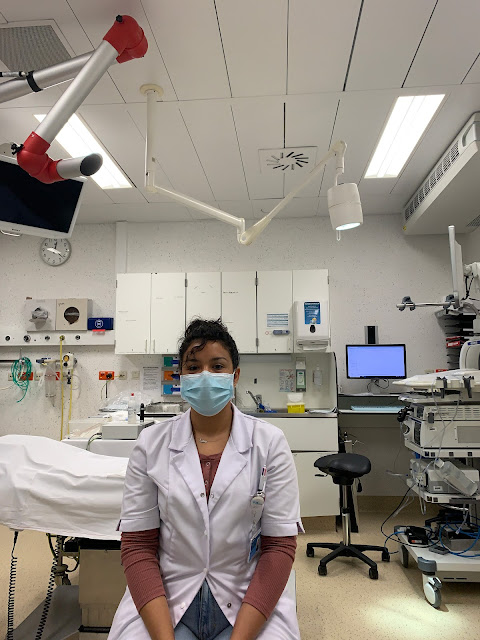Hepatology week 1 is done!
Once again, I apologise that there was no post yesterday; it was another one of those days. My doctor was alone on the ward, which meant we had twice the amount of patients to see. Yikes! I got home around 7 pm and fell asleep by 8 pm.
The cool thing about yesterday, though was that I got to perform my first solo ascites puncture, and I was successful! My doctor said I did a great job. Of course, I thought I could have done better. She disagreed and told me not to worry, I would feel more confident with time and practice.
Today we started in Proctology. By the afternoon, we’d seen 12 patients, performed digital rectal examinations and anoscopies. I saw your common proctologic cases of anal fissures, anal tags, and haemorrhoids. Some of the internal haemorrhoids my doctor was able to ligate with a rubber band, but the larger ones we had to recommend for surgery. For those with small internal haemorrhoids or external haemorrhoids, conservative treatment was the protocol. The clinic was quite exciting today because there were various cases, which is not so common, my doctor said.
 |
| Me in the Protology examination room. |
After the clinic, we headed to the ward. Like every other clinic I've been to so far, the consultations ran later than scheduled, that meant we didn’t have time for a lunch break. We ate lunch while sitting at the computers reviewing our patient files. We had our 13 patients to see...
One key takeaway from this week is hepatic encephalopathy. The most critical tool in determining if your patient has hepatic encephalopathy is physical examination. I noticed early in the week that in patients with liver cirrhosis, my doctor always asked the patient, where are you, what day of the week is it, what month are we in, what year are we in, what is today’s date etc. She did this to assess their mental status. Next, she asked the patient to hold out their arms in front of them with their wrists and fingers extended towards the ceiling, then she asked that they close their eyes. At this point, she looked at their hands and then she would press her hands against their hands. This examination was to test for asterixis, also known as the hand flapping tremor. It is very typical in patients with hepatic encephalopathy. Another common tool that doctor's use to examine hepatic encephalopathy is the animal name test. I never saw my doctor use this, but the professor explained it to me one day.
This week I saw how quickly a cirrhotic patient can decline. The transformation in just hours is unbelievable.
There were some long and exhausting days this week, but overall, it wasn’t so bad. I survived. Week 2, I’m ready!

Seeing people speaking about their dreams and progress really makes me smile so keep up the good work, you made it through tough week so take a day to rest and relax
ReplyDeleteOh and also I really like reading your blogs even though we haven't met or spoke or even know each other but there is always an energy boost and motivation that I get from your stories so thanks for sharing them
This is exactly why I started my blog. I hoped that my posts and life story would inspire others like you to pursue your dreams. I am so glad to hear that it is, continue to strive to be your very best. Thank you for your comment and compliments. I wish you much success wherever life takes you!
Delete